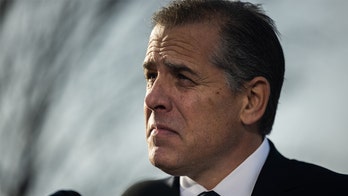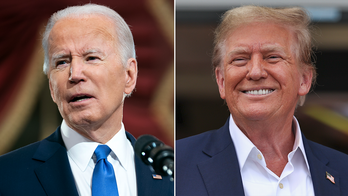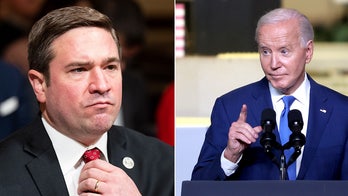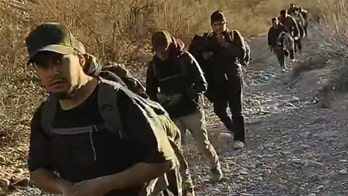Pakistan jails doctor for helping US find Bin Laden
Doctor convicted of high treason, sentenced to 33 years in prison
Former U.S. intelligence officers accused the Obama administration of dropping the ball on the case of the Pakistani doctor sentenced to 33 years in prison for helping find Usama bin Laden -- with one openly challenging the State Department's claim that it pressed his case "regularly" with Islamabad.
Officials are now raising a slew of concerns with how the U.S. government has handled the case.
Peter Brookes, a former analyst and adviser with several intelligence agencies who is now a senior fellow with the Heritage Foundation, told Fox News on Thursday that the U.S. should have had a plan to get him out of Pakistan immediately following the raid.
"You probably wouldn't want to have tipped him off ahead of time, but maybe the day right afterward you would have wanted to have helped him leave Pakistan -- and the same with anybody else who was working with us," he said.
Shakil Afridi, who reportedly is in his 50's, helped the CIA by running a vaccination program meant to try and verify bin Laden's location in Abbottabad.
With options for securing Afridi's freedom rapidly diminishing, Rep. Dana Rohrabacher, R-Calif., urged the administration to push back hard on Pakistan in light of the sentencing -- and cut off aid.
"Secretary Clinton will have to do more than voice protests over the Afridi case. Both the Departments of State and Defense need to take punitive actions against Pakistan. Carrots are not enough when dealing with an adversary. Sticks are needed to prove we are serious," he said in a statement.
Rohrabacher told FoxNews.com on Thursday he thinks "the administration hasn't done anything to indicate they are serious about the demand for this man's release."
Rohrabacher had authored a bill to grant Afridi U.S. citizenship -- though it never went anywhere in the House, and Afridi would have been in Pakistani custody at the time anyway.
Others are accusing the administration of imperiling Afridi by discussing his role in public.
State Department spokeswoman Victoria Nuland said Wednesday that "we have regularly taken up this matter with Pakistan" and will "continue to" going forward.
But Lt. Col. Tony Shaffer, a former military intelligence officer, disputed this claim.
"From what I'm hearing, we did pretty much nothing," he said. "We did nothing diplomatically at all, didn't raise a finger. ... From what my sources tell me, we did nothing to try and help this guy."
This, he said, was due to the sensitivities surrounding two significant and related stand-offs between Washington and Islamabad -- the friendly-fire incident in which a U.S. strike killed two-dozen Pakistani soldiers last November, and Pakistan's subsequent move to shut off supply routes into Afghanistan.
Because of these disputes, Shaffer said, the U.S. was reluctant to make a big push for Afridi's freedom. Rohrabacher also said he thinks that is what happened.
"It's kind of like when you're a teenager and you've pissed your parents off so badly, you don't want to do anything else to piss them off," Shaffer said.
Going forward, Shaffer agreed with Rohrabacher that the U.S. should seriously look at threatening to cut off Pakistan's aid -- something one Senate panel voted to do Thursday, with a vote to cut aid by $33 million.
"Clearly this guy helped do something the Pakistani government never did," he said. "They got this guy but they didn't get (Al Qaeda leader Ayman al) Zawahiri. So that's probably telling right there."
He and Brookes expressed concern that Afridi's plight could make it more difficult to convince foreign sources to work with U.S. intelligence on counterterror missions in the future.
"This guy was probably given assurances that he'd be protected if anything went wrong," Shaffer said.
It's unclear exactly how the Pakistani government first learned of Afridi's involvement.
A senior administration official pushed back on a claim by Rep. Peter King, R-N.Y., that the administration "put him out there."
"If you go back to the first stories about the doctor's alleged affiliation with the U.S., it was clear Pakistani authorities leaked it to the press," the official said.
The first mention of his name appears to be in a Guardian story in July 2011. By that time, Afridi had already been arrested -- the newspaper reported on the details of his vaccination program based on what it described as a "Guardian investigation." The Guardian reported that others were suspected of helping the CIA but that they were no longer thought to be in custody.
U.S. officials, though, went on to discuss Afridi's case publicly.
Defense Secretary Leon Panetta openly acknowledged the doctor's role in January, in an interview with CBS' "60 Minutes."
"I'm very concerned about what the Pakistanis did with this individual. This was an individual who, in fact, helped provide intelligence ... that was very helpful with regards to this operation," he said at the time. "And he was not in any way treasonous toward Pakistan. He was not in any way doing anything that would have undermined Pakistan."
Panetta was CIA director at the time of the bin Laden raid.
Shaffer said Panetta didn't help matters by speaking about the doctor's role, claiming that could have helped the Pakistani government build their case against him.
The U.S. "should have been working behind the scenes, never said a thing publicly," he said.
The CIA declined to comment Thursday when asked whether any efforts were made in the last year to fly Afridi out of Pakistan.
A senior U.S. official with knowledge of counterterror operations against Al Qaeda in Pakistan, though, said "the doctor was never asked to spy on Pakistan."
"He was asked only to help locate al Qaeda terrorists, who threaten Pakistan and the US. He helped save Pakistani and American lives. His activities were not treasonous, they were heroic and patriotic," the official said.
According to The Wall Street Journal, the CIA did work with Pakistan's ambassador to the U.S. to try and secure his release. Panetta also pressed Pakistani President Asif Ali Zardari for Afridi's freedom, the Journal reported.
Meanwhile, Pakistani officials are defending their treatment of the case.
A spokesman for the country's Foreign Ministry said "both countries should respect each other's judicial systems' processes" when asked about Afridi on Thursday.
Shaukat Qadir, a former Pakistani infantry commander who conducted his own investigation into Bin Laden's presence in Pakistan, also said that elements within the country's intelligence service are so paranoid about Pakistanis working as undercover CIA agents that "they won't allow much clemency when Afridi appeals so as to set an example and dissuade other citizens from helping the CIA."
In reference to Afridi's 33-year jail sentence, he said: "He won't outlive those years. That much is for certain"
Qadir did add that the courts may consider whether there were extenuating circumstances in Afridi's case. "He did work to a good end," Qadir said. "After all, the Pakistan government celebrated the death of Usama Bin Laden as a good thing."
Fox News' Dominic Di-Natale and Wendell Goler contributed to this report.





